👋 Today's issue is the first in a new tech-focused format here on Above The API.
Here's what to expect:
- Brief but thorough deep dives on the month's most important tech stories, written in an approachable, 'explain it to me like I'm 5' style. Thanks to one of my favorite writers, Sahil Bloom, for the idea.
- Summaries of interesting podcasts, newsletters, or videos worth your time.
- The best new products, apps, and hacks for productivity, wellbeing, and more.
- A few mind-blowing charts, figures, Tweets, or other bits of media.
- When time permits, a long-form piece on a noteworthy story or trend in tech.
If you'd like to learn more about what you'll find here, click the toggle below; otherwise, let's get into it 👇
About Above The API
Last year, I began writing longform articles on a space where I've spent the last 20 years of my life: the music business. My first piece, which covered the future of music, appeared in Andreessen Horowitz Future; I later published four more pieces on the streaming era and current issues facing the industry.
While I have no plans to stop writing on music, today marks the start of a parallel newsletter focused on what really excites me these days: technology.
Eight years ago – when I began working in tech and desperately wanted to get up to speed – I found that the majority of writers covering the sector write for an audience that is already quite tech-saavy. While many of those writers and newsletters do a phenomenal job covering the industry and where it's heading next, I began to wonder: what resources exist for someone outside of tech or venture capital to understand the forces increasingly shaping the world around them?
In the years since, tech's impact on our daily lives has increased by several orders of magnitude. AI now leads job interviews; synthetic biology and artificial intelligence are primed to upend life as we know it; and we're all spending a bit more time staring into that little black mirror in front of us a with each passing day.
"Every company is a tech company – some just don't know it yet" has become a popular refrain over the last decade. I believe this truism now extends beyond corporations to each of us: Above The API aims to help you learn, understand, and think critically about what comes next.
If you want to learn more about me, you can read more here.
Original Writing: On Meta Disruption
This week, I take a look at the existential challenges facing the world's dominant social media company, Meta, through the lens of digital advertising, privacy regulations, and eCommerce, offering thoughts on how the company's struggles are indicative of a deeper restructuring of power in Silicon Valley and beyond.
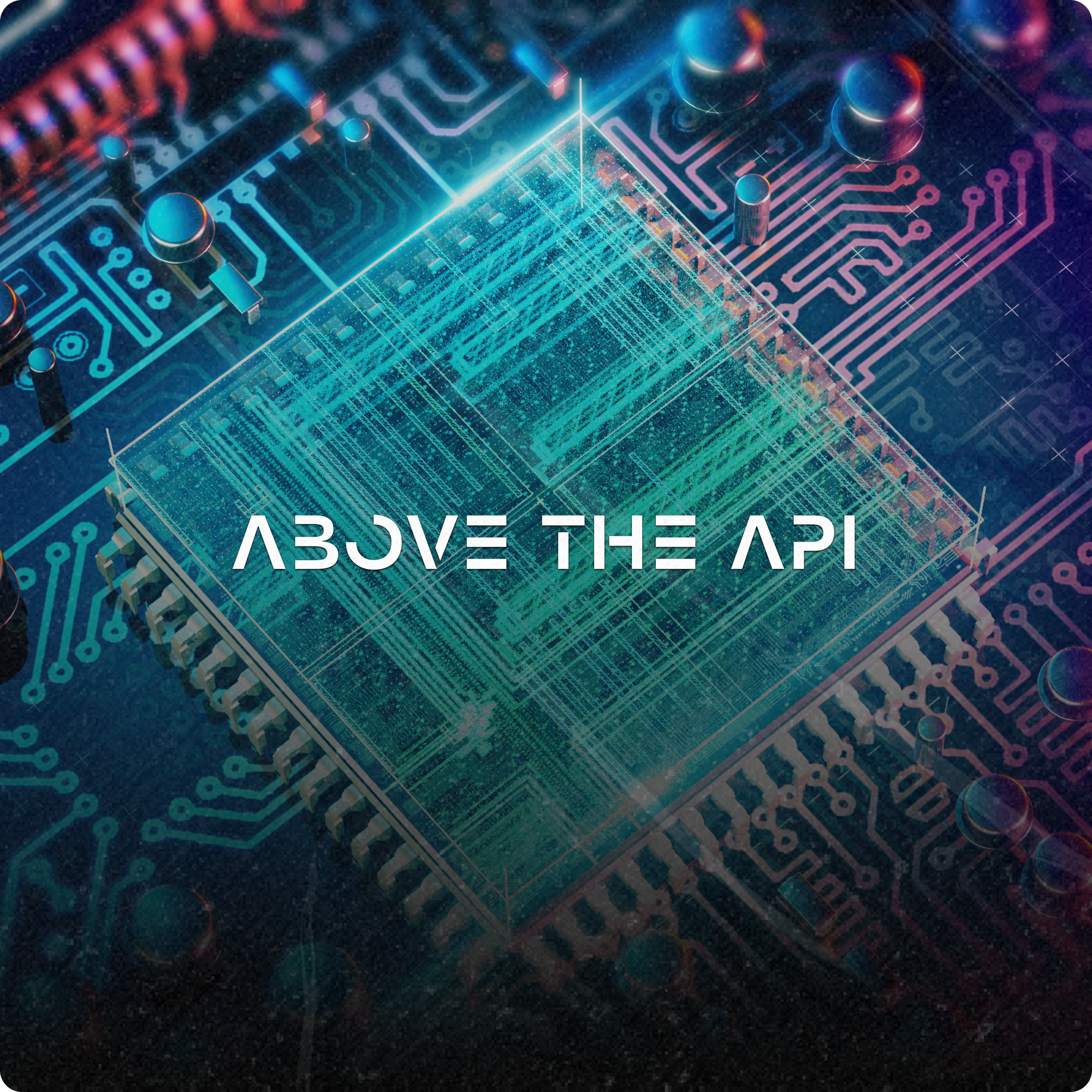
Top Stories
The Splinternet Is Here
Washington Post | CNET | Axios Login | Reuters
With the notable exception of China's Great Firewall, one of the Internet's most remarkable features following two decades of exponential growth is the relative homogeneity the online world offers users in nearly every corner of the globe. Whether in Los Angeles or Lagos, over four billion connected citizens (mostly) access the same dominant portals and enjoy seamless connections with friends, relatives, and associates across the street or the world. But the Internet's unified structure – the core interoperability of its protocols, service providers, and networks – is now more imperiled than at any time since its inception.
The sanctions enacted by a unified Western front in response to Russia's unconscionable declaration of war against Ukraine will likely push the concept of the Splinternet – a divided online world that looks quite different from our current one – directly into the mainstream consciousness. Russia's aggression hasn't only been met with financial and political countermeasures: the world's largest technology providers are increasingly pushing Putin's regime into an isolated technological hinterland. Consider just some of the actions taken by global tech leaders over the past two weeks:
- Microsoft: Suspended all new product sales and services in Russia; also played a pivotal role in mitigating cyberattacks against Ukrainian infrastructure and critical networks.
- Apple: Halted all product sales in Russia; severely limited ApplePay functionality; removed RT and Sputnik news from App Stores outside Russia; and disabled live traffic reports in Ukraine on Apple Maps.
- Google: Paused all ad sales in Russia; altered Google Maps functionality to protect Ukrainian citizens; blocked access to RT and Sputnik in Ukraine; and performed extensive takedown operations against propaganda content on YouTube.
- AirBnB: Fully suspended all operations in Belarus and Russia.
- Meta: Heavily restricted access to Russian state media; blocked all monetization and advertising from similar outlets. In turn, the company's services were the first to be blocked by Russia in retribution (only Facebook - Instagram and WhatsApp were not included in the ban), with Twitter suffering the same fate last Friday.
This last example – Russia itself blocking internet services – illustrates a key nuance to watch as the conflict evolves: that of internal versus external suspensions of service. While most cases noted above constitute an external limitation being imposed on Russian internet services – that is, an action taken by a Western nation or service provider – you'll likely see more internal limitations cropping up as well. A likely target? YouTube, which is the most widely used social media app in Russia;
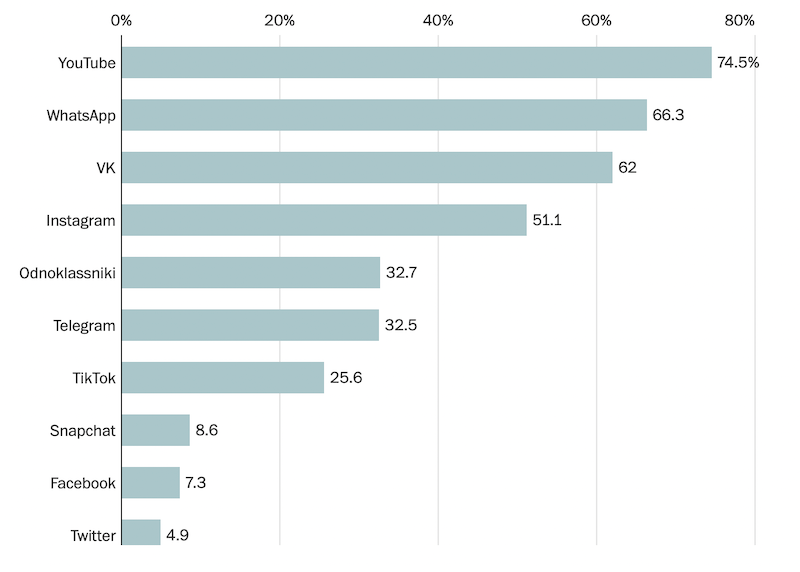
The second detail to note is the distinction between disruption of consumer-facing applications – such as Netflix, Facebook, and Instagram – and the backend infrastructure which supports these services. This is noteworthy due to the limited exposure leading American consumer-facing platforms have in Russia; as Politico notes, Apple, Meta, Google, and Netflix stand to lose only one to two percent of their global revenue by shuttering services in the country.
Far more consequential, then, are service suspensions or disruptions at the infrastructure layer. Last week, ICANN, the organization responsible for administrating the top-level domain names you access across the internet (such as .com, .co, or .ru, the most common Russian domain extension) rebuffed a Ukrainian request to revoke Russian domains and SSL certificates (which enable secure connections), two foundational aspects of a functional internet. Had ICANN complied with the request, much of the internet would have effectively ceased to function within Russia. Cogent, a U.S. based for-profit entity, voluntarily cut off all services to Russia late last week; Lumen, another top U.S. based infrastructure provider, followed suit this Wednesday. As leading providers of the intercontinental connections which shuttle data across the web, these actions will lead to slower connectivity and overall service degradation for Russian citizens accessing foreign websites.
To be sure, both types of separation – consumer versus backend applications – will likely have a marked impact on the ability of Russian citizens to access free and unbiased information. The latter class of services, however, represent a more fundamental threat to core functionality. Users can usually shift video streaming or messaging from one app to another; severing the actual links in underlying infrastructure is a notably more extreme course of action.
While blocking Russia's access to the internet and consumer-facing applications is justifiable, it's worth noting the likely consequences of such actions: we may not be far from a world in which the only information Russian citizens have access to is state-sponsored propaganda.
The chaos of war is similarly throwing another critical sector of the consumer internet – encrypted messaging apps, which ostensibly provide secure, private communication between sender and recipient – into disarray. Telegram, one of the world's most widely used platforms, just so happens to be founded by two Russian-born brothers; many InfoSec (cybersecurity) analysts have flagged the app's data collection practices as cause for serious concern.
Does Telegram still upload precise meter-accurate location data from its mobile client?
— Matthew Green (@matthew_d_green) March 3, 2022
If you're interested in diving deeper into the messaging aspect of this crisis, Protocol offers a great primer on the next wave of decentralized communication tools now entering the mainstream.
Silicon, Semiconductors, and Sovereignty
Investment Monitor | Reuters | Protocol | WIRED
As notable as service disruptions at the software layer will be, the ongoing conflict in Ukraine may well catalyze a fracture in an even more foundational aspect of our digital lives: the global flow of semiconductors themselves. In the 21st Century, semiconductors are the 'new oil'; elements so central to the proper functioning of society, industry, and day-to-day life that supply issues would have catastrophic consequences for affected nations. There are several aspects to this story that I'll try to summarize as succinctly as possible here.
First are the actions taken by the world's most dominant semiconductor manufacturer, TSMC. To understand why TSMC may now be the single most important company in the global economy, let's cover a few basics first.
What Are Semiconductors?
As their name implies, semiconductors are semi-conductive materials, falling somewhere between the conductive capacity (or lack thereof) of conductors and insulators. They are the building blocks of transistors and integrated circuits – driving any computerized device you use today, ranging from laptops and smartphones to automobiles, refrigerators, industrial control systems, and the electric grid itself.
Who Makes Semiconductors?
This is where things start to get interesting – and more than a bit scary. As the computing industry grew in the 20th century, alongside semiconductor giants such as Intel and Texas Instruments, the standard model was that of IDM's – Integrated Device Manufacturers – who design, manufacture, and sell their own chips. For decades, Intel was the leading example of this model: the company's engineers both designed blueprints and made those designs into finished chips. These integrated manufacturers at times crossed over into the public consciousness, as anyone old enough to recall the wildly successful Intel Inside campaigns of the 1990s can attest.
Over the past two decades, however, the industry has undergone a profound evolution with the ascent of companies like TSMC, otherwise known as semiconductor fabricators (or 'fabs'). Fabs now fulfill manufacturing duties for separate entities – such as Apple, Google, and NVIDIA – who design their own chips. This latter group – who are considered 'fabless', because they outsource manufacturing while owning the design process – are now the industry standard: eight of the world's ten most valuable corporations now design their own chips, but do not manufacture them in-house (the only two who don't design semiconductors at all are Saudi Aramco and Berkshire Hathaway). The transition to fabless manufacturing has been so widespread, in fact, that Intel CEO Pat Gelsinger is essentially betting the farm on transitioning to serve this burgeoning segment as his company fights to survive – which is as dramatic an example of 'vibe shift' as one may ever find in the business world.
TSMC's announcement, therefore, that it would cease to deliver chips to Russian companies (a move which Intel likewise made last week) is noteworthy in its own right: while the duration of such a ban will determine how disruptive it is in practice, a prolonged lapse in semiconductor supply to Russia could be devastating to its civilian and military sectors alike.
TSMC's decision, however, won't only impact Russia. Up to this point, I've left out one crucial detail about the company: the 'T' in its acronym is a reference to Taiwan, where it is based. If you've ever been curious as to why exactly you see so many news stories about even the slightest bit of tension between China and Taiwan, now you know: the world's top leading-edge semiconductor manufacturer just so happens to make the majority of its chips in territory which China views as its own. This detail leaves us with two additional aspects of the Russia semiconductor story to unpack.
The first is what actions Chinese chip manufacturers such as SMIC will take towards Russian aggression: to date, the company has not followed in the footsteps of TSMC and Intel in cutting off supply, and Protocol has an excellent summary here of the geopolitical tensions inherent in any such request from the United States. China has serious ambitions to make its domestic semiconductor industry the world leader over the next two decades, but is playing catch-up in attempting to do so; it might, therefore, be very appealing to view Russia as a captive market, given the country's lack of access to products from foreign rivals such as TSMC and Intel.
The second, of course, is what the Russia vs. Ukraine conflict can tell us about China's desire to bring Taiwan under its own flag. The list of similarities between the two conflicts is remarkable: both China and Russia seek to reaffirm control over a neighboring territory which each views as a threat due to Western influence and democratic governance. Russia's invasion of Ukraine – which supplies roughly half of the world's neon gas, an element critical to chip manufacturing – and the West's response to such aggression is therefore highly significant.
Many in both the East and West are surprised at just how unified the latter has been in confronting Russia's aggression with crippling economic sanctions. Time will tell if this collective action will serve as a meaningful deterrent to China's reunification ambitions. Given the central role semiconductor supply plays in modern life, however, one must imagine that any similar conflict in the Taiwan Strait would lead to a military confrontation between two of the world's largest nuclear powers. Needless to say, this is a story to watch closely going forward.
Cutting Russia off from global semiconductor supplies represents a preview of what form 21st century wars will likely take. The horrific power of nuclear weapons has indeed produced a period of unprecedented peace among powerful nations. The central nature of computing to all aspects of modern life, however, suggests that the wars of our current century may well be fought through conduits of information, not radiation.
Further Reading: Acquired Podcast | NYT | Stratechery | CNET | Bloomberg
Also Noteworthy
Uber As The Super App Of The West?

While 'Super Apps' – singular apps which offer users functionality across nearly every aspect of day-to-day life, including shopping, ride-hailing, and banking – have exploded in popularity across Asia over the past decade, the trend has enjoyed comparatively little success to date in the West, where consumers still interact with applications published by a wide range of developers. Uber wants to change that.
Last week, Uber announced the launch of Explore, a new tab in its app which will offer users personalized recommendations for activities including concerts and local events. As Protocol notes, Explore is part of a growing list of ancillary services – including grocery shopping, package delivery, and commercial freight – offered by the company adjacent to its primary verticals of ride-hailing and food delivery.
Will Uber be successful in recreating the Super App model of the East in the U.S. and beyond? Time will tell. The company's profitability is still a work in progress, and the air of mega-tech regulation in Congress seems unlikely to abate anytime soon, suggesting Uber CEO Dara Khosrowshahi will have an uphill battle on his hands.
A True Crypto Winter

It's been a tough few months for leading cryptocurrencies including Ethereum, Bitcoin, and Solana. Many are down 50% or more from all time highs set last fall, with investor sentiment shifting away from high-risk growth assets due to explosive inflation and the subsequent interest rate hikes likely coming this March.
Crypto's recent struggles, however, aren't confined to the market capitalization of its leading currencies. A slate of high-profile hacks and security incidents, relentless NFT scams, and general consumer disillusionment with the sector feels exponentially greater than it was just a few months ago.
While crypto detractors are nothing new, one aspect of the recent criticism percolating in tech circles does feel significant: the bonafide technological chops of those critiquing the movement. This piece from David Rosenthal, a highly qualified and experienced computer scientist who was employee number four at NVIDIA, offers a prime example.
While I remain optimistic about some potential applications of blockchain tech over the long term (five to ten years and beyond), especially for creators seeking to derive more compensation from their work, there can be no question that the 'everything go up' insanity of 2020-2021 is on hold for now – if not for much longer.
Is Google Search Dying?
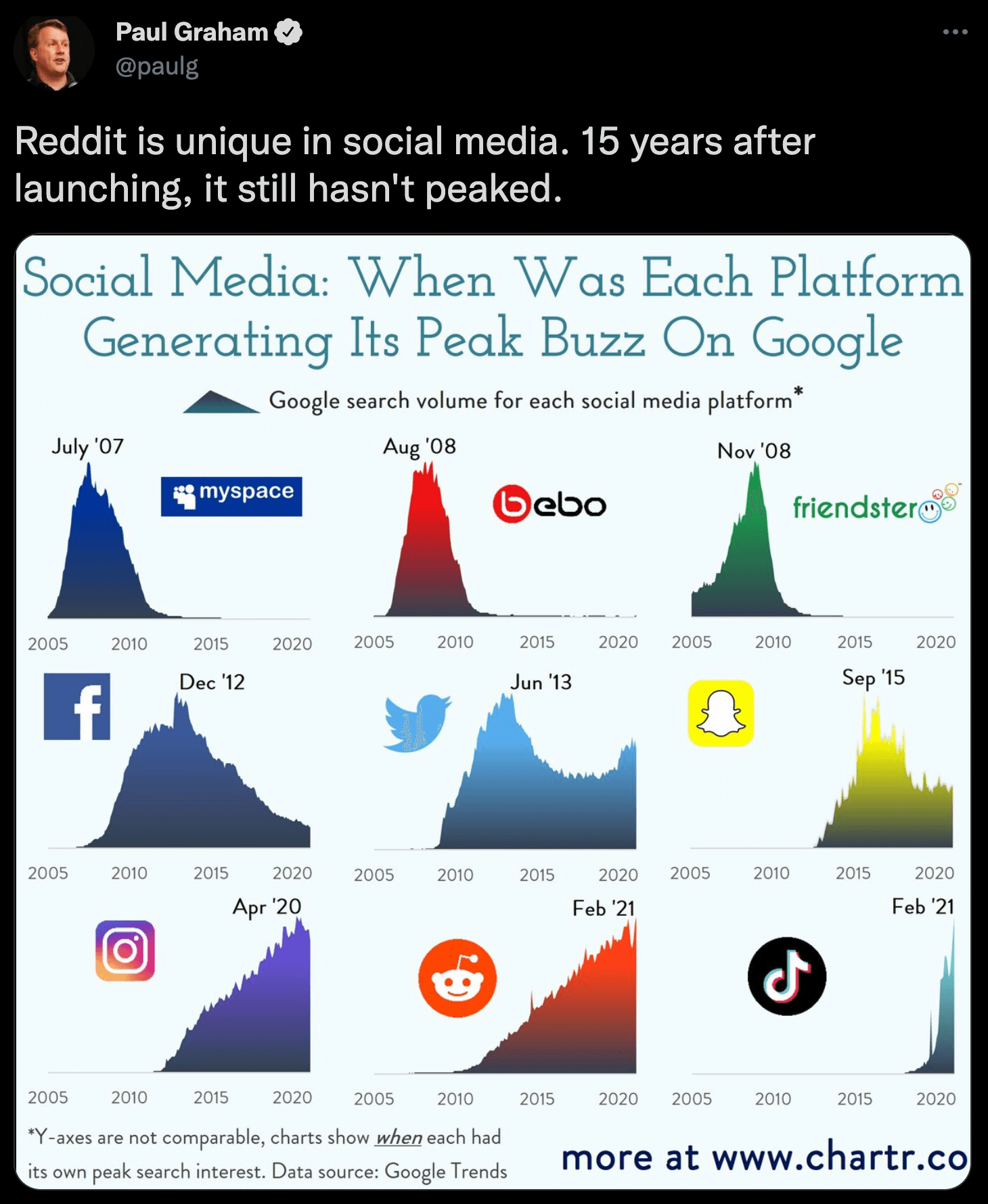
In one of the most buzzed-about pieces on Tech Twitter in February, dkb.io takes a look at the curious phenomenon of in-the-know technophiles adding the Reddit.com domain to Google searches in an effort to escape the Search Engine Optimization (SEO) hellscape that now plagues many common queries. If you've searched Google recently only to be sent to a top-ranked result which is littered with ads, meaningless gibberish (keyword stuffing), and pages upon pages to click through just to find your answer, this article is an entertaining read.
TikTok Troubles
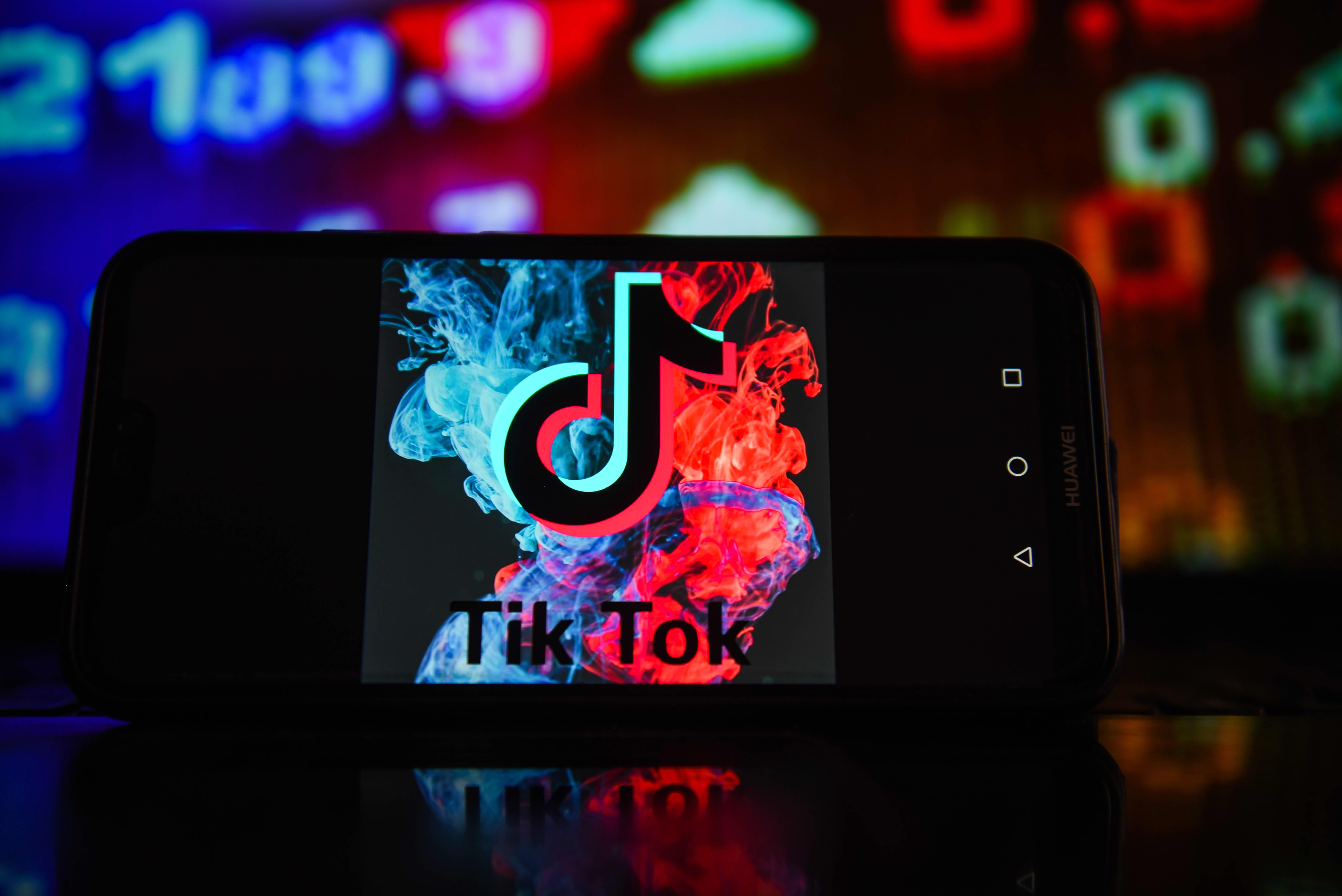
Measured by the time it took to reach one billion monthly active users, TikTok is the fastest-growing social network in history: it reached the mark in half the time of the previous generation of comparable apps, such as Instagram.
Genuinely incredible how quickly TikTok is growing - yesterday they announced they've hit 1B MAU's (monthly active users) after 4 years.
— Dave Edwards 🎧 (@itsDaveEdwards) September 28, 2021
For context, it took IG, YouTube, and Facebook 8 years each to get to 1B.
Story: https://t.co/U5J811aJN4
Infographic via @theinformation pic.twitter.com/xTfHzSUmYa
The app's influence on minors – long a source of hand-wringing and consternation in Washington, D.C. – is now under increasing scrutiny thanks to a bipartisan group of State Attorneys General. Unlike its aforementioned competitors, TikTok is not a U.S. company, as Bytedance, its parent corporation, is based in China – which suggests legislators may be far more willing to reign in the social network than its domestically-produced counterparts.
A Win For Human Creators

If you follow me on Twitter, you know I frequently ponder how coming advancements in Artificial Intelligence and Machine Learning will likely revolutionize – and fundamentally disrupt – creative industries like music. A recent landmark ruling by the U.S. Copyright Office, which found that the work of an algorithm alone is not entitled to copyright protection, is worth noting. While the ruling can certainly be seen as a win and temporary reprieve for human creators, I wouldn't read too much into this: within music particularly, I predict it will become quite easy for individuals and corporations to circumvent the spirit of this decision by tweaking the output of an algorithm ever so slightly and claiming it as their own.
Move Fast And Break Things Goes Hollywood

In the span of just four weeks, the American public will be treated to three major Hollywood productions focusing on founders that dominated the last decade of tech: Uber founder Travis Kalanick (Showtime's Super Pumped), Theranos founder Elizabeth Holmes (HULU's The Dropout), and WeWork founder Adam Neumann (AppleTV's WeCrashed).
My first thought here: it's remarkable that tech has become so central to our lives that its boardroom machinations are now the focus of three simultaneous high-budget projects. The second: I'd highly recommend reading the books behind these series to get a more accurate look at what transpired in each company's history, as they represent some of best journalism of the last decade.
Theranos: Bad Blood by John Carreyrou (a desert-island book for me).
WeWork: The Cult Of We by Eliot Brown and Maureen Farrell and Billion Dollar Loser by Reeves Wiedeman.
Uber: Super Pumped by Mike Isaac.
An Epic Acquisition
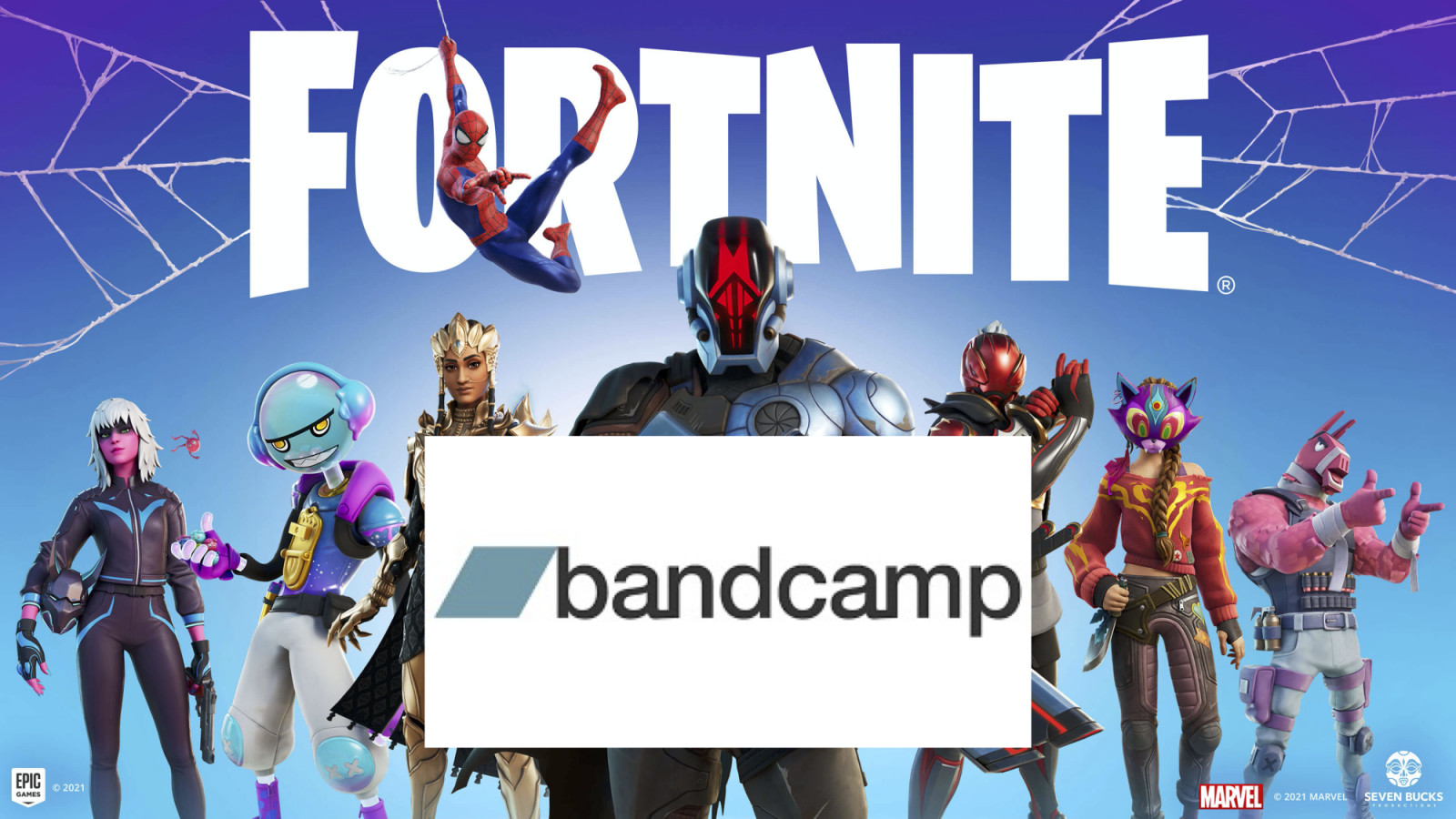
Last week, Music Industry Twitter was abuzz with the surprise acquisition of industry darling Bandcamp by Epic Games, the mega-publisher of global smash Fortnite.
Absolutely nobody in the music business saw this one coming, so it's even less likely anyone aside from Epic CEO Tim Sweeney knows what comes next. Many in the industry are justifiably concerned by the acquisition of a beloved platform serving independent creators by a company with zero experience in the music business.
My take? I think those who are pessimistic on the deal are justified in their concern. I do, however, believe that there are numerous paths forward for Bandcamp's creators that will enable them to keep the platform they love, while also benefitting from Epic's expertise in crafting immersive digital worlds, an area of great promise in the next decade of the music business.
🎧 Ear Candy

One of the most informative podcasts I've listened to in a long time. A great primer on the history of financial bubbles, mania, and fraud with Jamie Catherwood, including a great anecdote about the narrative fallacy of 'Tulip Mania'.

There are few more inspiring people in tech at the moment than David Friedberg, an ex-Googler who now runs The Production Board, a company focused on solving some of humanity's most pressing challenges.
TPB recently launched Cana, the world's first molecular beverage printer. While a beverage machine may not initially sound like 'solving humanity's most pressing challenges', I encourage you to go into this podcast (or read this primer on the product) with an open mind. Many of us take for granted just how inefficient and wasteful our current modes of production are for everyday goods, and beverages are some of the worst offenders in existence.
As I mentioned several weeks ago when I included Cana's launch memo in my Reading List, my real excitement here is the shift in what matters in technology. I firmly believe that the next decade and beyond will redefine how most of us think about 'tech'; while the last ten years were mostly about surface-level consumer apps and the growth of social media, the next ten will be about curing disease, extending healthspan and lifespan, and tackling really hard, important problems.

If the next decade will be about solving big problems, Synthetic Biology might just be the single most exciting space to be in; this podcast from Azeem Azhar (who also runs the excellent Exponential View newsletter) with Gingko Bioworks CEO Reshma Shetty, is a great primer on the sector's potential.

If your curiosity on semiconductors was piqued by today's newsletter, this one is a great listen. Business Breakdowns speaks with Brinton Johns and Jon Bathgate, investors focused on the semiconductor value chain, with a particular focus on Cadence – a software platform which is akin to Adobe Photoshop for chip designers.
All The Hacks

Sometimes you find the right app at just the right time. After musing recently about how broken the experience of trying to retain information from podcasts is, I stumbled upon Snipd, an amazing new podcast app that does almost exactly what I described a few weeks ago on Twitter;
Who’s building a podcast app that has (reasonably accurate) speech to text, highlighting, and bookmarks/notes?
— Dave Edwards 🎧 (@itsDaveEdwards) February 15, 2022
The entire experience of trying to retain info from podcasts seems so broken to me, surprised more people aren’t going after this.
Maybe I should build one 🤔
Snipd does...exactly that. If you listen to podcasts to learn, it will be your new best friend. Snipd lets you easily bookmark snippets to revisit later, auto-generate transcripts, add notes, and share snippets with friends.

Rows is a very cool spreadsheet-on-steroids app I discovered recently, and it's well worth a try if you work with sheets often. Rows lets you seamlessly connect external data sources – across a wide range of products like Google Analytics, YouTube, Twitter, and almost any API – to your spreadsheets in just a few clicks. As someone who recently spent many tens of hours building a custom Python app to periodically push API data into a Google Sheet, this one is a welcome addition to my productivity arsenal.

A really useful, dead-simple app. Open it and type to make a written note; speak to make a voice note; or take a photo of a book or other written work and get an instant photo-to-text bookmark. Although I rely on Craft to be my digital brain, Quick Capture is great for, well, quickly capturing something.
Random Finds 🤯
Haptic feedback gloves that can accelerate learning and facilitate re-learning of skills for those with traumatic brain injuries:

The declining price of Solar Energy. Given recent world events, this one feels worth paying attention to.
The declining price of solar will just never cease to amaze me. pic.twitter.com/EI7wavvysu
— Michael Thomas (@curious_founder) March 3, 2022
Great software seems simple. It's not – it's just great at abstracting complexity away from the user. Consider this flow chart showing how Slack decides to send you (or not send you) a single notification. Then consider that is just one small sub-feature of an app running on tens of millions of client devices around the globe, fetching and pushing data in real time, in varying states of network connectivity and...you get the idea.
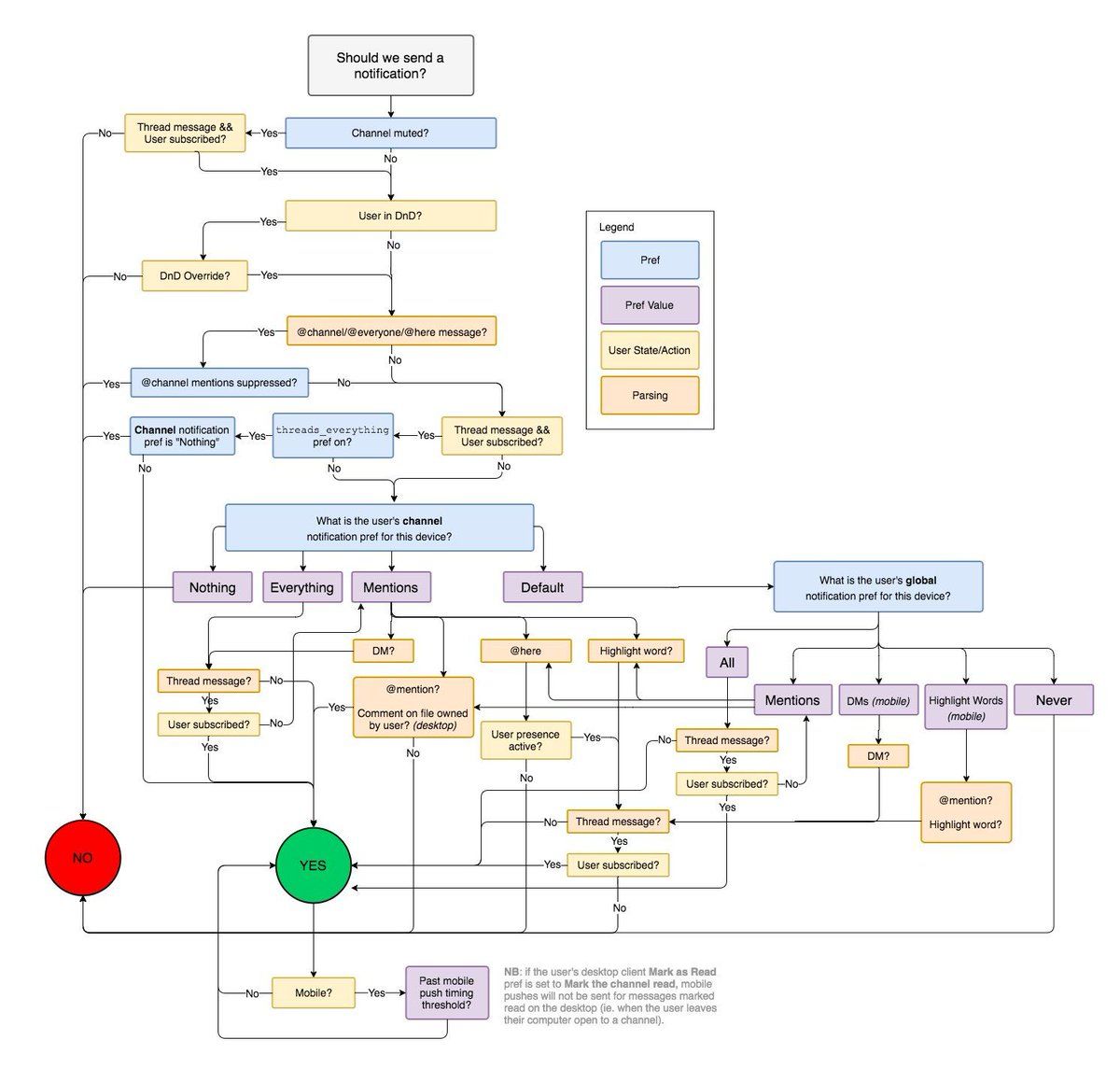
We humans have a really hard time grasping exponential growth. This week's release of Apple's updated in-house Apple Silicon chips offer a great example of what it looks like in practice:
how it started: how it’s going: pic.twitter.com/C1EZTKN2DO
— Ken Shirriff (@kenshirriff) March 8, 2022
All the CPUs in all the Macs Apple sold in 1984: 25bn transistors
— Benedict Evans (@benedictevans) March 8, 2022
One Mac Studio: 114bn
What does a building for testing elevators look like? Well, now you know.
testing facility for thyssenkrupp elevators in Zhongshan City pic.twitter.com/2L4jG2Nel6
— Kane 謝凱堯 (@kane) December 20, 2021
The O.G. Peloton:
1984 virtual reality exercise bike.
— Pulp Librarian (@PulpLibrarian) December 10, 2021
Of course it’s brown. pic.twitter.com/anbzmYc2rO
This looks fun;
That's it for this month's issue! If you enjoyed it, please consider sharing, subscribing (it's completely free), and following me on Twitter. See you in April.











